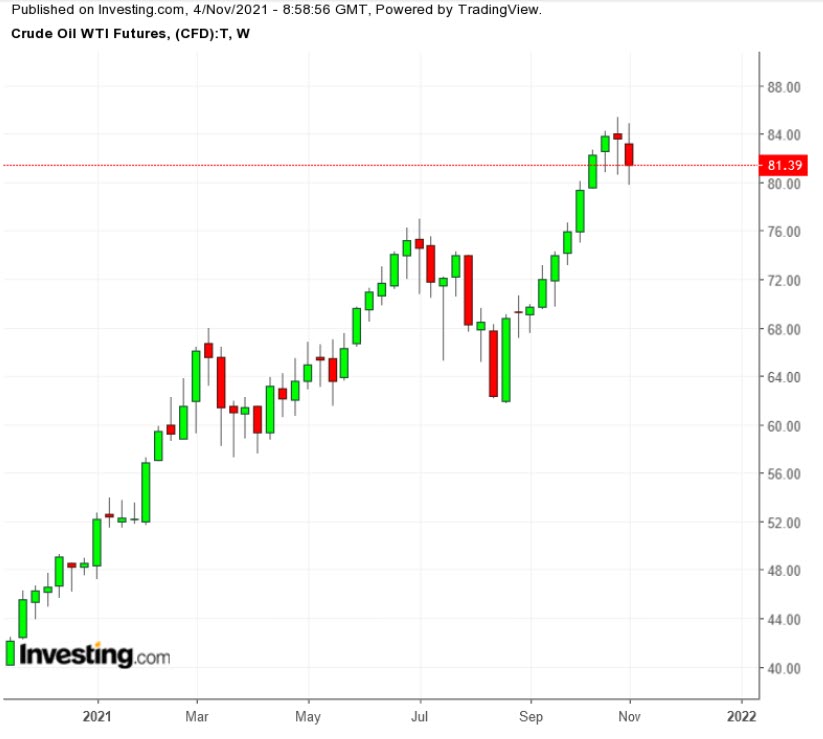Other than the COP26 Climate Summit in Glasgow, two additional, big events are dominating the oil market this week. First, OPEC and OPEC+ have scheduled meetings for today (Thursday, Nov. 4) to evaluate oil production policies for December. Second, the Biden administration dealt a blow to the U.S. oil and gas industry when the Environmental Protection Agency (EPA) proposed new regulations on methane released during oil and gas production.
1. OPEC+ Meeting
Select oil consuming nations, including Japan, India and the United States, have been pressuring producing countries like Saudi Arabia to increase production to relieve what they see as excessive fuel costs.

However, their national needs are not necessarily the concerns of OPEC+, and it does not look like OPEC+ is sympathetic to their requirements at this time. Under previous leadership, OPEC often considered the negative impact of excessive energy costs on the global economy, which they feared would hurt demand for their products. However, it does not seem that OPEC+ is currently concerned about lower demand from higher costs or whether rising energy costs are hindering global economic growth.
The Joint Technical Committee of OPEC+ met last week in preparation for this week’s ministerial meeting and reviewed new demand forecasts. The OPEC+ technical experts downgraded their expectation for oil demand growth in the fourth quarter and now only see a 300,000 bpd shortage of oil as opposed to a previous forecast of a 1.1 million bpd shortage.
This would indicate that OPEC+ does not foresee a problem continuing with its current plans to increase production by only 400,000 barrels per day in December. Market analysts also seem to expect OPEC+ to continue with the status quo of adding just 400,000 barrels per day in December. If OPEC+ goes ahead with expected actions, the market should not be surprised. However, in the unlikely chance that OPEC+ adds more production, the market should fall lower—if only temporarily.
A U.S. energy official made a slightly odd comment that left people wondering if the White House might possibly lift oil sanctions on Iran if OPEC+ does not increase production. The Biden White House is under pressure to achieve lower domestic oil, gasoline and natural gas prices. The White House seems intent on trying to blame OPEC+ for high prices rather than on the market fundamentals and domestic U.S. regulations and the financing environment. (See more below on this topic).
It seems unlikely, though, that the White House would lift Iran sanctions without so much as a perception that Iran negotiated on nuclear issues. Another thought is that the White House will release some oil from the U.S. Strategic Petroleum Reserve (SPR), but that won’t help much to alleviate prices. Even if the U.S. releases 100 million barrels, that is only equivalent to global demand for a single day. Moreover, U.S. refineries are running near current capacity and they’re unlikely to increase refinery runs just because of an SPR release.
2. New Proposed EPA Rules on Methane
Coinciding with President Biden’s speech at the COP26 Summit, the U.S. EPA announced it was proposing new regulations concerning the release of methane during the production and transportation of oil and gas. This will potentially impact more than one million existing and new wells plus pipelines and storage facilities.
The proposed regulations are not clear yet. As well, they would need to go through the regulatory process—which involves comment—before taking effect. We do not know what the rules would mean for oil producers on a daily basis other than they will be expensive and would likely make some operations less profitable or even not profitable at all.
The immediate impact of the proposed EPA rules is having a chilling effect on the energy industry. Since the start of the Biden administration, the industry has been hesitant to invest in new production. This will only exacerbate that hesitancy.
It will also make financiers even more wary of oil and gas projects. Smaller operators will be more severely impacted by these rules whereas larger operators are more likely to be able to afford the cost increases. However, smaller companies are currently the ones drilling new wells in the U.S., whereas larger firms are not.
On the one hand, the White House keeps hoping for lower oil and gas prices. It's pushing OPEC+ for more production for that very reason. On the other hand, the White House seems intent on hampering domestic U.S. production, which causes prices to rise. As long as the industry is confused or scared off by this White House, U.S. production will struggle to grow.
